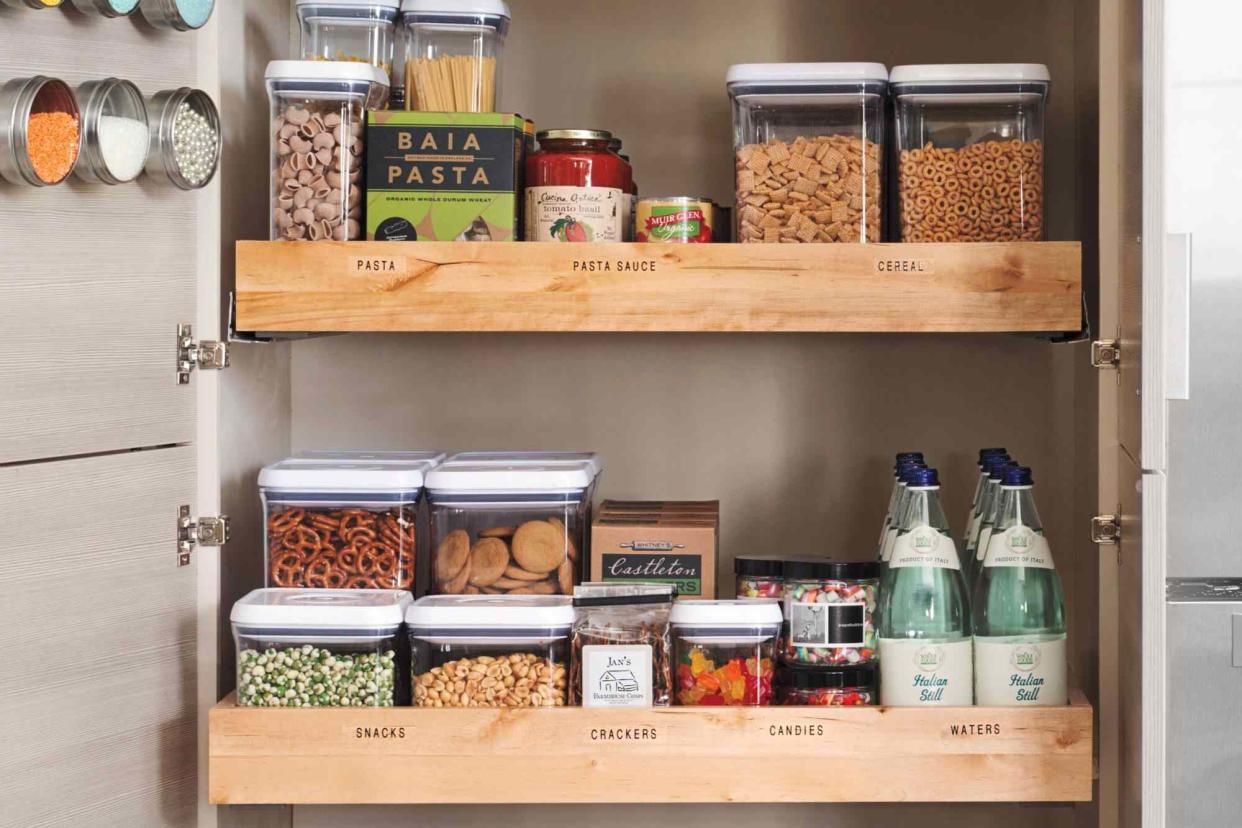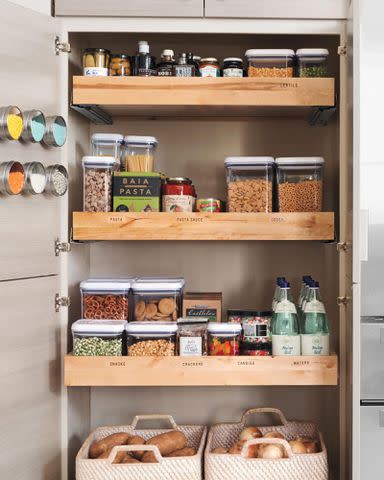Our Pantry Shopping List Has All the Essentials Home Cooks Need

Stock up on these long-lasting basic foods and flavor boosters to make meal planning a cinch.
Pasta, grains, canned goods, spices, and baking staples are the types of pantry essentials everyone should keep in their kitchen. These foods are the basis of many meals and have a longer shelf life than items you store in the refrigerator. Stocking up is the key to being better prepared for almost any situation, from dinner on the fly to bake-sale chocolate cupcakes you can whip up in a heartbeat.
Your list of must-haves might differ from your friend's or neighbor's, depending on your tastes or skill level, but generally, these are the goods you should always keep on hand. And so you can keep them at their best, we've also included how long they keep for. Our helpful guide draws on information from Martha Stewart's Homekeeping Handbook.
Related: Martha's 39 Best Kitchen Organizing Tips Will Help You Make the Most of Your Space

Cans, Jars, and Tubes
A good stash of canned foods and bottled items offers a treasure trove of inspiration. From canned tomatoes and beans to tinned fish, tubes of anchovy paste, and jars of capers and mustard, these essentials all help you get a meal on the table pronto.
Heed expiration dates; otherwise, most canned and jarred goods, such as preserves, pickles, and relishes, can be kept unopened for up to one year. Once opened, glass bottles should be refrigerated; transfer unused canned goods to airtight containers and refrigerate for three or four days. This is especially important for canned acidic foods such as tomatoes or pineapples; once the interior of the can is exposed to air, the acidity is likely to cause rust. If you spot rust on an opened can of food, discard both the can and its contents.
Italian plum tomatoes
Tomato paste (we prefer tubes over cans)
Green and black olives
Olive paste
Anchovies
Anchovy paste
Capers
Chickpeas
Black beans
Hot sauce
Mustards
Italian oil-packed tuna
Low-sodium chicken broth
Canned fruits
Chutneys
Fruit jam
Dried Pasta
From penne with tuna puttanesca to spaghetti with marinara sauce, there's no limit to the number of dishes you can make with dried pasta. You can store it in its original box until opened, then transfer it to airtight containers. It is best used within one year of purchase.
Assorted shapes including spaghetti, penne, rigatoni, capellini, fettuccine, lasagna, orzo, and couscous
Grains, Rice, and Dried Beans
Whether you use them as the foundation of a meal or a side, grains, rice, and dried beans are versatile pantry staples, which is why we always keep them at the ready. Dried items, except cornmeal, can be stored in the pantry for up to one year. To discourage pests, keep cornmeal in the freezer for up to one year.
Quick-cooking polenta
Stone-ground cornmeal
Oats
Various types of rice such as: Arborio, long-grain white, medium- to long-grain brown, and basmati rice
Lentils
Black-eyed peas and split peas
Black, pinto, and cannellini beans
Flageolet beans
Oils and Vinegars
A variety of oils and vinegars are essential to any well-functioning kitchen.
Oils
Whether you use them for stir fries or in marinades or dressings, it's important to have cooking oil options. Store vegetable oils in the original bottles, unrefrigerated, in a cool, dark place for up to six months. Refrigerate nut oils (such as walnut oil), and use within three months. Do not store oils next to the stove.
Extra-virgin olive for cooking and for drizzling
Canola oil
Peanut oil
Vinegars
Keep all types of vinegar in their original bottles, and store them in a cool spot for up to one year.
Cider
White wine
Red wine
Rice wine
Sherry
Spices, Dried Herbs, and Seasonings
Maintain a well-rounded collection of the spices, herbs, and seasonings you use most frequently—choices will vary from household to household, but every cook relies on them to elevate or enhance a dish. Most spices will lose their potency after about a year, but their flavor will deteriorate faster if stored improperly. Keep them in airtight, light-proof containers, away from heat. Choose an accessible drawer or cabinet or a wall-mounted rack (do not hang it above the cooktop).
Vegetables
Only hardy vegetables such as potatoes, onions, and garlic should be stored in your pantry. Potatoes should not be refrigerated; keep up to two weeks' worth in baskets or bins in a cool, dry, dark, well-ventilated spot. Take them out of plastic, which can encourage mold, Keep onions, shallots, and garlic in the pantry for up to one month—do not refrigerate them. Store each vegetable in a separate basket or bin; it's especially important to keep potatoes and onions apart since they can cause each other to spoil.
Dried Mushrooms
Dried mushrooms are a multi-tasking ingredient that brings savory, umami flavor to soups, stews, and risotto. Store dried wild mushrooms in airtight containers in a dark cool place like your pantry. They will last for two to three years if stored correctly.
Baking Staples
Having everything you'd need to whip up a batch of cookies or a cake is a good idea. Store ingredients in airtight containers, away from heat and light sources. Extracts, like pure vanilla or almond, will last several years; leavenings like baking soda and baking powder lose their potency after about one year; pay attention to their expiration dates.
Pure vanilla extract (and other extracts)
Baking soda
Baking powder
Unsweetened and semisweet dark chocolate
Unflavored gelatin
Dry yeast
Cornstarch
Flours
Whether for baking a dessert or breading chicken for dinner, flour is a pantry essential. We suggest keeping a few varieties on hand, including all-purpose, which, as its name suggests, is the go-to for all kinds of uses, from thickening sauces to making a birthday cake. Store wheat flours in airtight containers at room temperature for up to one year. Choose containers with wide mouths for easy scooping and measuring. Freeze almond and other nut flours for up to six months.
Sugars and Other Sweeteners
Humidity can make solid sugars lumpy, so stow them in well-sealed containers in a cool, dry spot. Double-wrap brown sugars to keep them moist. Store syrups at room temperature in their original containers for up to one year.
Granulated white, superfine, light and dark brown, and confectioners' sugar
Light corn syrup
Molasses
Pure maple syrup
Nuts, Nut Butters, and Dried Fruits
Protein-packed nuts, nut butters, and dried fruits are great snacks and can be used as an ingredient in a host of dishes. To safeguard nuts from turning rancid, store them in the refrigerator for up to six months or the freezer for up to a year. Nut butters can last up to two years if unopened. Dried fruits can be stored at room temperature for six months to a year, but they last longer if kept well sealed in the refrigerator, which preserves freshness and prevents stickiness.
Pecan and walnut halves
Pine nuts
Peanuts
Cashews
Almonds
Hazelnuts
Raisins
Golden raisins
Currants
Dried apricots
Dates
Figs
Sun-dried tomatoes
Read the original article on Martha Stewart.
